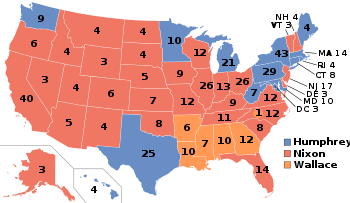US presidential election, 1968
|
|
|||||||||||||||||||||||||||||||||||||
|---|---|---|---|---|---|---|---|---|---|---|---|---|---|---|---|---|---|---|---|---|---|---|---|---|---|---|---|---|---|---|---|---|---|---|---|---|---|
|
|||||||||||||||||||||||||||||||||||||
|
All 538 electoral votes of the Electoral College 270 electoral votes needed to win |
|||||||||||||||||||||||||||||||||||||
| Turnout | 60.9% |
||||||||||||||||||||||||||||||||||||
|
|||||||||||||||||||||||||||||||||||||
|
Presidential election results map. Red denotes states won by Nixon, blue denotes those won by Humphrey, orange denotes states won by Wallace, as well as a North Carolina faithless elector who cast his electoral vote for Wallace instead of Nixon. Numbers indicate the number of electoral votes allotted to each state.
|
|||||||||||||||||||||||||||||||||||||
|
|||||||||||||||||||||||||||||||||||||
The United States presidential election of 1968 was the 46th quadrennial presidential election, held on Tuesday, November 5, 1968. The Republican nominee, former Vice President Richard Nixon, won the election over the Democratic nominee, incumbent Vice President Hubert Humphrey. Analysts have argued the election of 1968 was a major realigning election as it permanently disrupted the New Deal Coalition that had dominated presidential politics for 36 years.
The election year was tumultuous; it was marked by the assassination of Civil Rights Movement leader Martin Luther King Jr., subsequent King assassination riots across the nation, the assassination of Democratic presidential candidate Robert F. Kennedy and widespread opposition to the Vietnam War across university campuses. Incumbent President Lyndon B. Johnson, who had won a landslide victory for the Democratic Party four years earlier, declined to seek re-election amid growing discontent over the Vietnam War and his worse-than-expected showing in the New Hampshire primary. The 1968 Democratic National Convention was a scene of violent confrontations between police and anti-war protesters as the Democrats split into multiple factions.
...
Wikipedia





